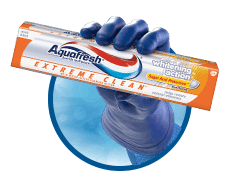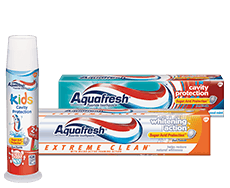How Many Times a Day Should You Brush Your Teeth?
From developing habits of consistently brushing your teeth to flossing on a regular basis, and even scheduling routine checkups with your dental hygienist, there are many ways you can help yourself to have a healthy smile. But how many times a day should you brush your teeth? We’ll discuss how to properly care for your teeth with brushing and flossing tips and techniques as well as recommendations on how often you should have your teeth cleaned.
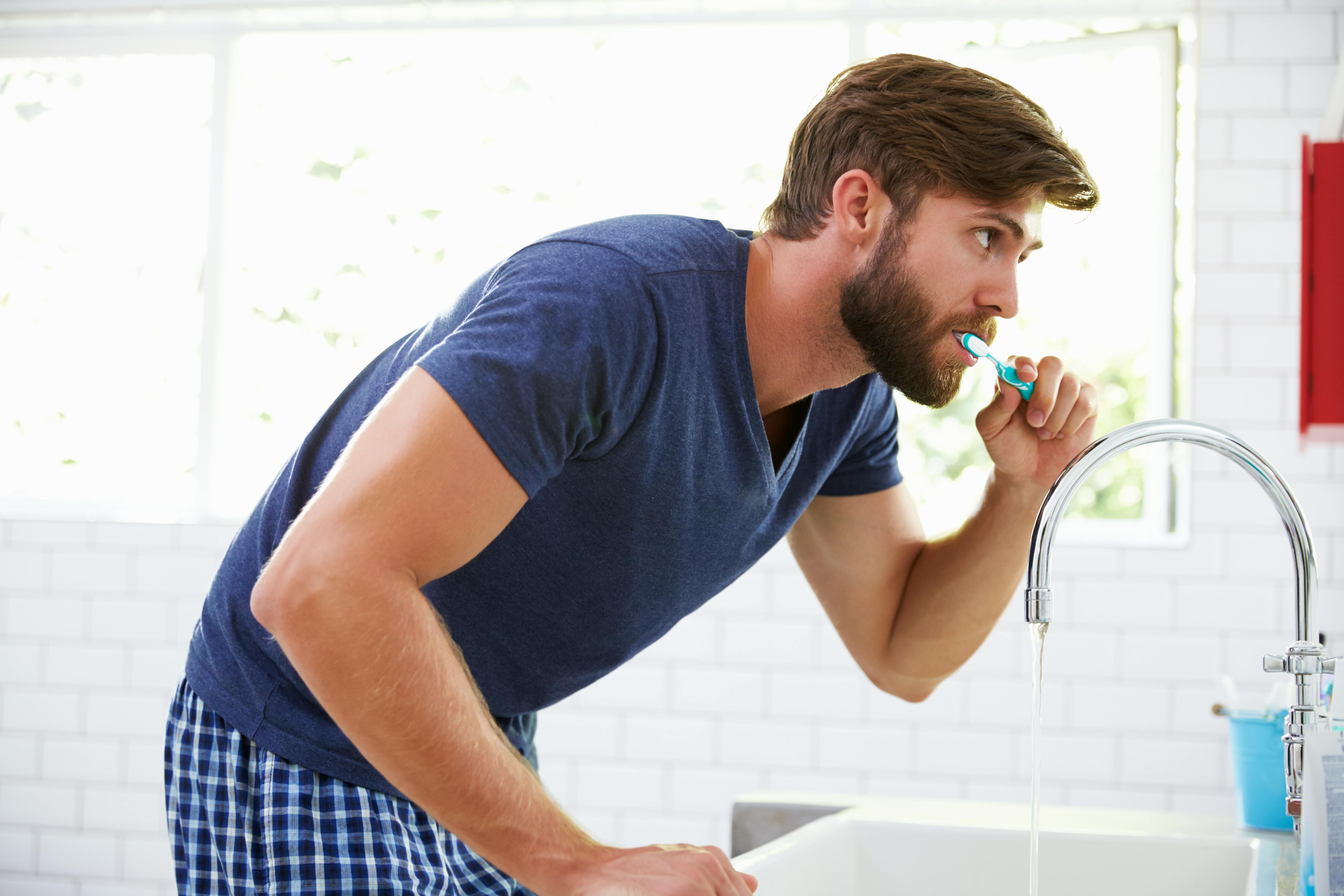
Brushing Your Teeth: Tips and Techniques
How many times a day should you brush your teeth, and for how long? According to the American Dental Association (ADA), you should brush your teeth twice a day and for two minutes each time to remove dental plaque, which can cause tooth decay and can lead to gum disease.1 Use a soft-bristled toothbrush that fits your mouth and can reach all areas with ease.2 Be sure to change out your toothbrush as soon as the bristles become worn or every three to four months, unless directed to change it sooner by a healthcare provider.2
Not only do you want a proper toothbrush for a thorough cleaning, but an effective brushing technique can also be a game changer for better oral hygiene.2 We suggest:
- Placing your toothbrush at a 45-degree angle to the gums.2
- Move the toothbrush gently back and forth in short, tooth-wide strokes.
- Make sure to brush the outer, inner, and chewing surfaces of the teeth so that you don’t miss any food that may be hiding.2
- Brush for about two minutes, as this suggested time ensures you spend enough time effectively cleaning your teeth.6
- The “2-and-2 method” can help you remember how many times a day you should be brushing your teeth. The “2-and-2 method” means brushing twice a day for two minutes.
Always follow the directions provided by your dental professionals.
Flossing Tips and Techniques
Not only is developing a solid tooth brushing routine important for good oral hygiene, but so is creating a schedule to clean in between the teeth. Cleaning plaque off your teeth can be done with a toothbrush and floss or interdental cleaners. Floss or interdental cleaners are used to clean in-between your teeth.1 If plaque between your teeth isn’t removed, it can harden on your teeth above or below the gum line, causing the gums to become red and swollen, and it may lead to complications like gingivitis.1 Here are some suggested flossing techniques that can help you remove plaque and any food stuck between your teeth:
- Use a string of floss that’s about two feet long and wrap it around the middle finger of each hand.1
- Grip the floss between your thumb and index finger of each hand.1
- Place the floss gently between your teeth until it reaches the gum line.1
- Curve the floss like the letter “C” around the tooth, sliding the floss up and down under the edge of the gum – be careful not to force the floss too far under the edge of the gum line as this could cause potential damage.1
- Move from one tooth to the next, until you’ve flossed in between all teeth.
Remember to always follow the directions given by your dental professionals.
The Gravity of Getting a Cavity
Without taking proper care of your teeth by brushing and cleaning in between your teeth on a daily basis, you could be more prone to developing cavities. Cavities—also known as tooth decay or caries—start with a buildup of plaque bacteria in your mouth, which usually is caused by infrequent brushing.3 This can also be exacerbated by consuming sugary foods and drinks.3
If the enamel breaks down, then sensitivity can occur. You could experience, mild to sharp pain when eating or drinking something sweet, hot or cold, and you may even see brown and black staining on the surface of a tooth.3
In order to avoid developing cavities, you can be sure to care for your teeth every day.3 You should also get regular professional dental exams and teeth cleanings to help spot any signs of tooth decay or other oral disease early on.3 Depending on your needs, your dentist and oral hygienist may recommend more frequent cleanings.
Be sure to talk with your dental professional if you think you’re developing symptoms of tooth decay. Learn more about dental hygiene by exploring our resources on topics like cavity prevention, the causes of bad breath, and more.
Frequently Asked Questions
How Long Should Kids Brush Their Teeth?
Take care to brush your child’s teeth for no less than two minutes.4
What Is the Best Time of the Day to Brush Your Teeth?
Most important is to remember to care for your teeth 2 times a day, unless your dental professional gives you different directions. Generally, the suggested times are in the morning and before going to bed at night. Going to bed without brushing your teeth can increase your chances of getting cavities because plaque can build up overnight.5
Can You Brush Your Teeth Three Times a Day?
It’s perfectly acceptable to brush your teeth three times a day, but make sure you are using the right technique and brush gently.1,2
- Oral Hygiene. National Institute of Dental and Craniofacial Research. https://www.nidcr.nih.gov/health-info/oral-hygiene/more-info. Accessed 08/08/2024.
- Brushing Your Teeth. Mouth Healthy. https://www.mouthhealthy.org/en/az-topics/b/brushing-your-teeth. Accessed 08/08/2024.
- Tooth Decay. National Institute of Dental and Craniofacial Research. https://www.nidcr.nih.gov/health-info/tooth-decay. Accessed on 2/5/2021. Referenced text indicated on page 1 in source PDF.
- Toothbrushing – children 0-6 years. Better Health Channel. https://www.betterhealth.vic.gov.au/health/
conditionsandtreatments/toothbrushing-children. Accessed 08/08/2024. - Bedtime Oral Hygiene Behaviours, Dietary Habits and Children’s Dental Health. National Center for Biotechnology Information. https://www.ncbi.nlm.nih.gov/pmc/
articles/PMC8160840/. Accessed 08/08/2024. - Brushing up on brushing. Harvard Health. https://www.health.harvard.edu/staying-healthy/brushing-up-on-brushing. Accessed 08/08/2024.
Do My Teeth Look Brown To You?



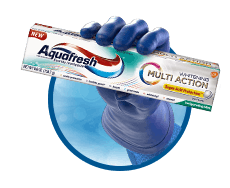
Aquafresh® Multi Action® Whitening can help brighten your smile in no time.
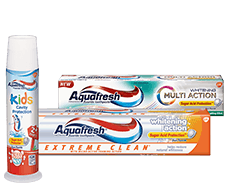
Get 75¢ off any one Aquafresh® product.

Check out more from Captain Aquafresh® to learn how to fight cavities.
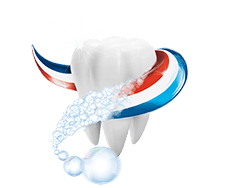
Learn more about your oral health and how Aquafresh® helps keep you feeling clean.



